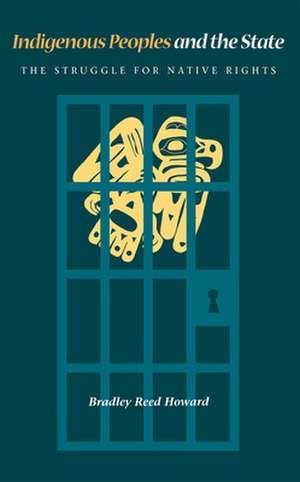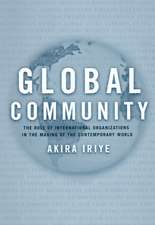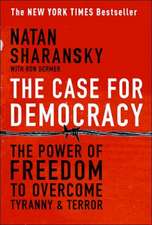Indigenous Peoples and the State: The Struggle for Native Rights
Autor Bradley Reed Howarden Hardback – 14 aug 2003
Long dismissed as relics of a primitive past, indigenous peoples are increasingly seeking international recognition and protection of their rights to land, water, and fundamental human freedoms. Anthropologist Bradley Reed Howard surveys the struggles of indigenous groups for self-determination in the United States and internationally, calling crucial attention to the urgent need for native social and political representation.
Indigenous Peoples and the State presents an overview of the confrontation between tribal groups and both nation-states and international organizations. Howard places indigenous issues within the larger context of the work of nongovernmental agencies, United Nations initiatives on human rights, and national self-determination. Two specific case studies of indigenous legal status and rights—involving the Iroquois in the United States and the Maori in New Zealand—illuminate native peoples' claims to sovereignty, traditional culture, territory, and natural resources.
Ethical problems inevitably arise in any attempt to define identity. Investigating the complex issues of colonialism and culture, Howard reveals that anthropologists have at times played a complicit role in tribal subjugation. He also emphasizes the contributions many cultural anthropologists have made to the progressive transformation of law and recognizes their efforts to preserve indigenous cultures and natural habitats. Anthropological approaches, Howard maintains, offer the best hope for understanding the magnitude of indigenous peoples' worldwide endeavors to attain human rights.
Indigenous Peoples and the State draws extensively from native sources on questions of identity, rights, and sovereignty. North American Indians, the Maori, and numerous other native peoples assert international recognition of their independence and status as "peoples" through their treaties and agreements with Western nations. They further demand an accessible international forum through which they can achieve justice and promote national self-determination. Howard's bold analysis offers extraordinary anthropological and legal support for the declarations and aspirations of indigenous peoples.
Indigenous Peoples and the State presents an overview of the confrontation between tribal groups and both nation-states and international organizations. Howard places indigenous issues within the larger context of the work of nongovernmental agencies, United Nations initiatives on human rights, and national self-determination. Two specific case studies of indigenous legal status and rights—involving the Iroquois in the United States and the Maori in New Zealand—illuminate native peoples' claims to sovereignty, traditional culture, territory, and natural resources.
Ethical problems inevitably arise in any attempt to define identity. Investigating the complex issues of colonialism and culture, Howard reveals that anthropologists have at times played a complicit role in tribal subjugation. He also emphasizes the contributions many cultural anthropologists have made to the progressive transformation of law and recognizes their efforts to preserve indigenous cultures and natural habitats. Anthropological approaches, Howard maintains, offer the best hope for understanding the magnitude of indigenous peoples' worldwide endeavors to attain human rights.
Indigenous Peoples and the State draws extensively from native sources on questions of identity, rights, and sovereignty. North American Indians, the Maori, and numerous other native peoples assert international recognition of their independence and status as "peoples" through their treaties and agreements with Western nations. They further demand an accessible international forum through which they can achieve justice and promote national self-determination. Howard's bold analysis offers extraordinary anthropological and legal support for the declarations and aspirations of indigenous peoples.
Preț: 404.28 lei
Nou
Puncte Express: 606
Preț estimativ în valută:
77.37€ • 79.93$ • 64.39£
77.37€ • 79.93$ • 64.39£
Carte tipărită la comandă
Livrare economică 26 martie-09 aprilie
Preluare comenzi: 021 569.72.76
Specificații
ISBN-13: 9780875802909
ISBN-10: 0875802907
Pagini: 258
Dimensiuni: 152 x 229 x 25 mm
Greutate: 0.54 kg
Ediția:1
Editura: Northern Illinois University Press
Colecția Northern Illinois University Press
ISBN-10: 0875802907
Pagini: 258
Dimensiuni: 152 x 229 x 25 mm
Greutate: 0.54 kg
Ediția:1
Editura: Northern Illinois University Press
Colecția Northern Illinois University Press
Recenzii
"An impressive, comprehensive study that makes a major contribution to scholarship on indigenous peoples."—Vine Deloria Jr., University of Colorado at Boulder
"Original and exciting, Indigenous Peoples and the State signals the emergence of an important scholar."—Robert A. Williams Jr., University of Arizona
"Original and exciting, Indigenous Peoples and the State signals the emergence of an important scholar."—Robert A. Williams Jr., University of Arizona
Cuprins
Table of Contents
1. Indigenous Peoples and the Anthropology of Domination
2. Indigenous Cultures and the Law in North America
3. The Iroquois Struggle for Independence
4. Indigenous Rights in International Law
5. The United Nations and Indigenous Peoples
6. The Maori of Aotearoa (New Zealand) and the Treaty of Waitangi
Conclusion: Anthropology and the Liberation of Indegenous Nations
Appendix: The "Mataatua Declaration"
Works Cited
Index
2. Indigenous Cultures and the Law in North America
3. The Iroquois Struggle for Independence
4. Indigenous Rights in International Law
5. The United Nations and Indigenous Peoples
6. The Maori of Aotearoa (New Zealand) and the Treaty of Waitangi
Conclusion: Anthropology and the Liberation of Indegenous Nations
Appendix: The "Mataatua Declaration"
Works Cited
Index
Descriere
Long dismissed as relics of a primitive past, indigenous peoples are increasingly seeking international recognition and protection of their rights to land, water, and fundamental human freedoms. Anthropologist Bradley Reed Howard surveys the struggles of indigenous groups for self-determination in the United States and internationally, calling crucial attention to the urgent need for native social and political representation.
Indigenous Peoples and the State presents an overview of the confrontation between tribal groups and both nation-states and international organizations. Howard places indigenous issues within the larger context of the work of nongovernmental agencies, United Nations initiatives on human rights, and national self-determination. Two specific case studies of indigenous legal status and rights—involving the Iroquois in the United States and the Maori in New Zealand—illuminate native peoples' claims to sovereignty, traditional culture, territory, and natural resources.
Ethical problems inevitably arise in any attempt to define identity. Investigating the complex issues of colonialism and culture, Howard reveals that anthropologists have at times played a complicit role in tribal subjugation. He also emphasizes the contributions many cultural anthropologists have made to the progressive transformation of law and recognizes their efforts to preserve indigenous cultures and natural habitats. Anthropological approaches, Howard maintains, offer the best hope for understanding the magnitude of indigenous peoples' worldwide endeavors to attain human rights.
Indigenous Peoples and the State draws extensively from native sources on questions of identity, rights, and sovereignty. North American Indians, the Maori, and numerous other native peoples assert international recognition of their independence and status as "peoples" through their treaties and agreements with Western nations. They further demand an accessible international forum through which they can achieve justice and promote national self-determination. Howard's bold analysis offers extraordinary anthropological and legal support for the declarations and aspirations of indigenous peoples.
Indigenous Peoples and the State presents an overview of the confrontation between tribal groups and both nation-states and international organizations. Howard places indigenous issues within the larger context of the work of nongovernmental agencies, United Nations initiatives on human rights, and national self-determination. Two specific case studies of indigenous legal status and rights—involving the Iroquois in the United States and the Maori in New Zealand—illuminate native peoples' claims to sovereignty, traditional culture, territory, and natural resources.
Ethical problems inevitably arise in any attempt to define identity. Investigating the complex issues of colonialism and culture, Howard reveals that anthropologists have at times played a complicit role in tribal subjugation. He also emphasizes the contributions many cultural anthropologists have made to the progressive transformation of law and recognizes their efforts to preserve indigenous cultures and natural habitats. Anthropological approaches, Howard maintains, offer the best hope for understanding the magnitude of indigenous peoples' worldwide endeavors to attain human rights.
Indigenous Peoples and the State draws extensively from native sources on questions of identity, rights, and sovereignty. North American Indians, the Maori, and numerous other native peoples assert international recognition of their independence and status as "peoples" through their treaties and agreements with Western nations. They further demand an accessible international forum through which they can achieve justice and promote national self-determination. Howard's bold analysis offers extraordinary anthropological and legal support for the declarations and aspirations of indigenous peoples.












